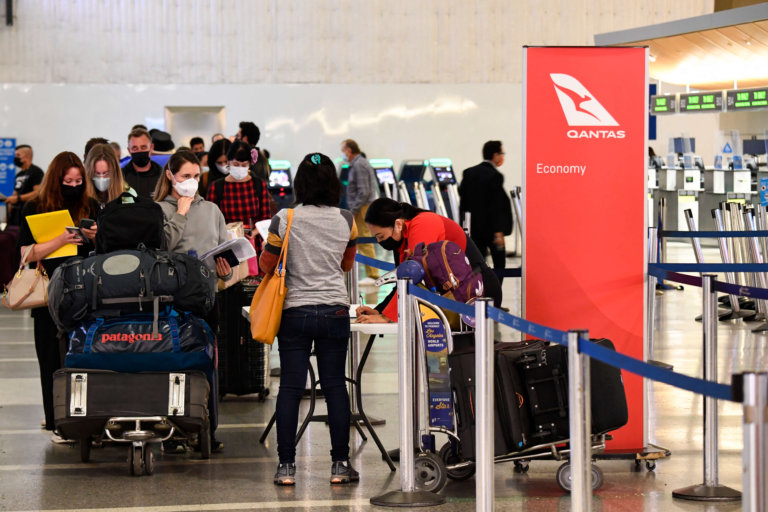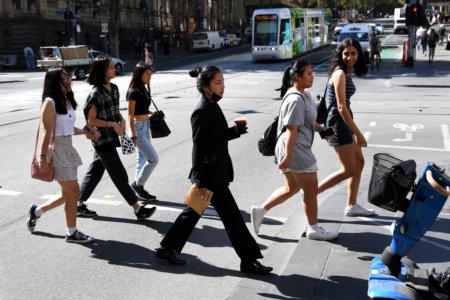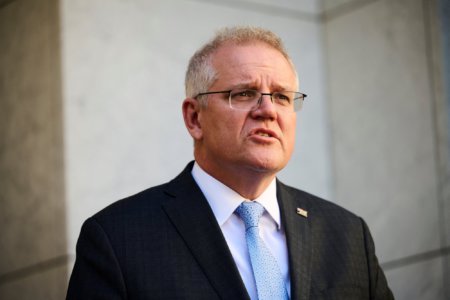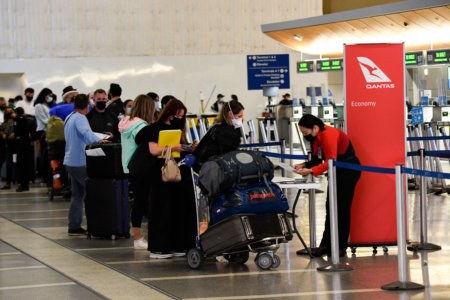
International students travelling to Australia might experience confusion over flight, arrivals and quarantine plans at this time. That’s why we’ve compiled a quick state-by-state arrival guideline before you get on that long-awaited plane ride.
International students under pilot plans and border exemptions have already begun arriving in Australia, and more are expected to follow suit. They will not, however, be subject to the same rules. Presently, states and territories have varying rules on border entry and quarantine — which may change as they monitor the impact of the Omicron variant on infection rates.
The National Cabinet had just convened in Canberra at the time of writing, and more changes might apply in the next coming weeks as Omicron cases continue to develop.
For now, here’s a state-by-state breakdown of entry and arrival regulations into Australia for your reference:
Travelling to Australia: The basics
Vaccine certificate
You must show evidence that you’ve completed your latest dose at least seven days prior to arrival, with an Australian-approved or recognised vaccine. The vaccine certificate must be the official document that is issued by the country where you were vaccinated. For more information on vaccinations and travelling to Australia, click here.
Fees
Expect to pay an exorbitant sum for your entry into Australia. You will likely have to fork out extra money for soaring travel fares, on top of covering for quarantine fees at a designated facility.
Your quarantine costs could be anywhere between 1,000 Australian dollars to over 3,000 Australian dollars, depending on your situation. It’s best that you plan ahead financially to also include an emergency fund in case new COVID-19 measures are announced in the coming weeks.
Australian Travel Declaration form
All travellers entering Australia as of December 2021 will need to obtain the Australian Travel Declaration (ATD) form prior to departure. The form must be completed at least 72 hours prior to your flight to Australia. Click here for a step-by-step guideline on completing the form.
PCR test
Unless you have been exempted, you must produce a negative PCR COVID-19 test before entering Australian borders. The test must be taken 72 hours before your departure flight into Australia. A separate PCR test will be required within 24 hours of your arrival.
Travelling to Australia: A state-by-state guideline
Victoria
International students flying into Victoria will need a Border Permit in addition to the ATD form. From December 21 onwards, all fully-vaccinated travellers arriving at the state need to self-quarantine upon arrival, take a PCR test within 24 hours, and remain isolated until a negative result is obtained, according to an official Twitter post by the Victorian Department of Health.
Unvaccinated travellers from overseas still need to undergo a mandatory 14-day quarantine period at a designated hotel.
Expect to take the COVID-19 test at least four times throughout your 14-day quarantine. If you’ve tested positive while quarantining, you will be transferred to a health hotel.
Maximum fee charges for a hotel quarantine in Victoria are as follows:
- A$3,000 for one adult
- A$1,000 for each additional adult within the same room or apartment
- A$500 for each child between three and 18 years
The invoice will be issued after your quarantine ends, with the option to choose payment plans that suit your financial circumstances.
For more information about quarantine measures in Victoria, click here.
New settings are in place for vaccinated international travellers arriving in Victoria, who will no longer need to self-quarantine for 72 hours. pic.twitter.com/9m0LZ7pkxf
— VicGovDH (@VicGovDH) December 21, 2021
New South Wales
Foreigners who are fully vaccinated with an eligible visa can enter New South Wales without applying for a travel exemption starting from December 15.
A negative COVID-19 result is procured from a test taken 24 hours before arrival, beginning December 21. The PCR test can be done at a NSW testing clinic, where most tests are free without booking. For more information about self-isolation in NSW, click here.
Those who are not fully vaccinated must enter a 14-day mandatory quarantine. The fee is fixed at A$3,000 per adult, with additional adult occupants charged at A$1,000 each.
Hotel quarantine at NSW is only applied to stays exceeding 48 hours. You can check the state government’s website for more information on quarantining in NSW.
Arriving into NSW from overseas?
Different rules apply depending on vaccination status and the countries you’ve been in before your arrival in NSW.
Check the requirements that apply to you: https://t.co/PRqKS2BHw6 pic.twitter.com/oBXw3xSTi9
— NSW Health (@NSWHealth) December 1, 2021
Queensland
All international travellers into Queensland must complete an ATD form and a Queensland International Arrivals Registration.
Unless you’re flying in from a safe travel zone country on a quarantine free-flight, or have been issued an official health exemption, you must quarantine for 14 days. Your residency status and home conditions in Queensland will determine whether you’re eligible for home quarantine or hotel quarantine.
For home quarantine, you will need to arrange for private transport with an endorsed transport provider to travel to your residence. Public transportation, taxis and rideshares are not allowed at this time.
If you have to quarantine at a hotel, a government-provided transportation will take you to your accommodations. The fees are listed below:
- A$3,220 for one adult in one room
- A$4,130 for two adults sharing one room
You may apply for a fee waiver after receiving the invoice. For a full breakdown of quarantine costs in Queensland, click here.
BREAKING: Queensland will reopen at 1am on 13 December as we move towards the 80% vaccination milestone earlier than expected.
Nominating a time and date for reopening gives everyone certainty to book flights and accommodation and make plans to visit loved ones. pic.twitter.com/lYWnKoAUAk
— Annastacia Palaszczuk (@AnnastaciaMP) December 6, 2021
Western Australia
International entries into Western Australia will require a G2G Pass Declaration alongside an ATD form. To get your G2G Pass, visit this website.
All direct international arrivals must complete 14 days of quarantine at a designated hotel. Multiple PCR tests will be carried out throughout your quarantine period, with additional tests done after leaving quarantine.
You are not allowed to enter Western Australia from another state within 14 days of arriving in Australia, unless you’re an approved traveller. The quarantine fees are:
- A$2,520 per person for one room
- A$3,360 for two persons sharing one room.
The state has just announced on December 22 that it’s closing the border to Tasmania and the Northern Territories on Boxing Day, The Guardian reports.
WA Covid update: Western Australia closes borders and mandates vaccine boosters – video https://t.co/FusvqnrVaH
— Guardian Australia (@GuardianAus) December 22, 2021
If you are travelling through another jurisdiction prior to WA, you will be subject to entry requirements of that state. This includes a connecting flight, even if you are not leaving the airport, as well as travelling by road.
More information: https://t.co/vbNcLvSz0K pic.twitter.com/yrqC49GKJm
— WA Government (@WAGovernment) December 20, 2021
Do you know what to look for in choosing premises that are suitable to self-quarantine?
To find out the requirements of a self-premises to self-quarantine please visit https://t.co/MAPVCd3mnF pic.twitter.com/hwPAKUlefd
— WA Government (@WAGovernment) December 22, 2021
South Australia
All international arrivals to the state must complete an EntryCheckSA application. Currently, only vaccinated travellers are allowed to enter South Australia, unless an exemption is approved.
You may be required to quarantine at a medi-hotel upon landing even if you’ve been approved for home quarantine based on an assessment of your background, COVID-19 status and housing situation.
Hotel quarantine fees are fixed at A$3,000 per adult, and A$1,000 for additional adults. You will have 30 days to settle the fees after an invoice is issued at the end of your quarantine.
Updates for Low Risk arrivals and quarantine at home (or anywhere not in a medi-hotel). Read more here: https://t.co/47uxIa9o8c pic.twitter.com/7Mf4M5xpGt
— South Australia Police (@SAPoliceNews) December 22, 2021
Northern Territory
Fully-vaccinated international travellers may enter Northern Territory without the need for quarantine. You’ll need to complete a Border Entry Form within seven days prior to departure, and download the G2G Now app for compliance monitoring.
A mandatory PCR test is required within three days of arrival, and another one on the sixth day. You’re allowed to take the Rapid Antigen Test if PCR testing isn’t available in your area.
For more information on COVID-19 testing and arrivals in NT, visit the government’s website.
Tasmania
Fully-vaccinated travellers (including those unvaccinated due to medical exemptions) must register through the Tas e-Travel system, where you’ll obtain a QR code required to enter the state. The application for travel can begin up to seven days prior to your proposed arrival date.
You can register to travel without a test requirement or a mandatory quarantine as a fully-vaccinated traveller, and have not been in extreme-risk areas 14 days before arriving in Tasmania.
Travellers without vaccinations need to get approval to enter the state and will be required to quarantine up to 14 days in suitable premises. Quarantine costs are A$2,800 per person, with A$1,000 charged for each additional adult.
These are Tasmania’s new COVID-19 rules and restrictions now that the state’s border is open #covid19tas https://t.co/XQslIDek4m
— Monte Bovill (@MonteBovill) December 15, 2021










